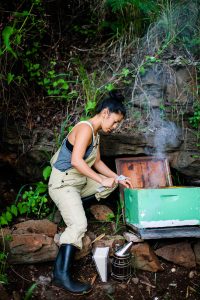Jasmine Joy: The Mindfulness of Beekeeping

Jasmine Joy started beekeeping when she was living on the North Shore of Oahu, Hawaii. She started working at Honey Girl Organics in 2011 because her best friend was working for the company that makes organic skin care with all products from the hive – beeswax, honey, propolis, and royal jelly. That friend eventually left and Jasmine took over the managerial duties of manufacturing the skin care line. She learned how to bee-keep and remove wild hives from homes through the company as well.
A year later, in 2012, Jasmine started Beelieve Hawaii, an organization that provides educational outreach, habitat restoration and honey bee rescue on the island of Oahu. In 2015, Jasmine became a partner of Hoa Aina O Makaha, a nonprofit which she describes as “not just a farm” but a “sacred sanctuary that is right next door to an elementary school.” By becoming a member of this farm, Jasmine got her start in teaching third graders about the life cycle of a honey bee, the different bees in the hive, and how bees communicate. The name of this program is called the Pollinator Program. About 100 kids participated in the program during its first year.
“Mindfulness is what really fuels my company, my mission, and what I believe,” says Jasmine. “[In] everything that my company does, mindfulness is embraced.” And Jasmine embraces beekeeping in many aspects of her life. Jasmine’s colleague studies the endangered Hawaii yellow-faced bee, Hylaeus, a species found only in Hawaii, and with him, she started a nonprofit called Bee Collective. Between Beelieve Hawaii and Bee Collective, Jasmine gets to work with children, young adults, and older adults on a regular basis.
Jasmine advises new beekeepers to find a mentor they respect who share the same values and energy. For those on an intermediate level, she advises seeking out a good place for an apiary and having two or more hives “which allows you to experience how each colony has a different personality and works as a superorganism,” says Jasmine.
For her own business, Jasmine is a treatment-free beekeeper. Below most of her hives, she keeps an “oil bottom board,” which is a tray you can pull out and pour mineral oil into. Above that is a sheet of mesh separating the bottom board from the hive box with holes only small enough that the African Small Hive Beetles can fall through. Another method of pest management Jasmine uses for mite control is organic powdered sugar. While she says it’s likely that every hive in Oahu has mites, responsible beekeepers should take care of their bees as best they can, “giving them the best environment that you can provide for them,” she says.

“I let my bees do their thing,” says Jasmine. “I have a real spiritual connection with them and I’m more of that kind of beekeeper – very intuitive.” If she observes a colony not doing well – that is not bringing in any nectar, not making comb for the queen to lay, Jasmine will concoct a “bee tea” for them with herbs, vitamins, and sugar water.
Beekeeping in Hawaii is unique because, as a tropical climate, there really is no “off season.” However, climate change is evident here as it is anywhere else. Typically, half of the year is hot and dry on Oahu, and the other half is cooler, wetter weather but Jasmine has seen the typical second swarm that ends in mid to late summer go all the way through to October. “My phone was ringing for wild swarms past the season, and other bee removalists are seeing this as well.”
In addition to climate change, Jasmine notes that beekeeping can get rather territorial. “The ways of the old patriarchy…of wanting to segregate from everybody and work alone…is falling apart.” On the one hand, she understands this from the perspective that beekeeping for her is “a very intimate time. It’s like my church.” But on the other hand, she acknowledges that “it’s important that [beekeepers] come together and teach each other different ways because we can all become better.”
Media Attributions
- Jasmine Joy © Jenny Sathngam is licensed under a All Rights Reserved license
- Jasmine Joy with beehive © Melissa Robin is licensed under a All Rights Reserved license


Feedback/Errata